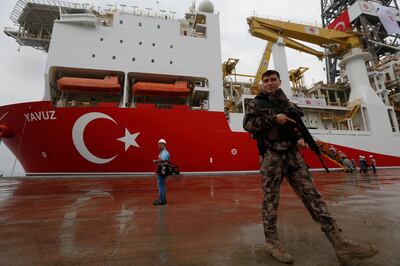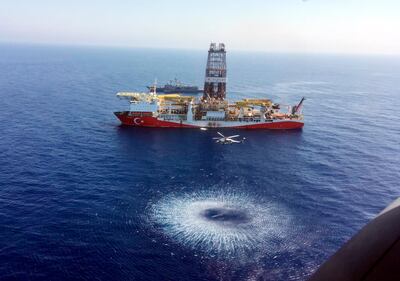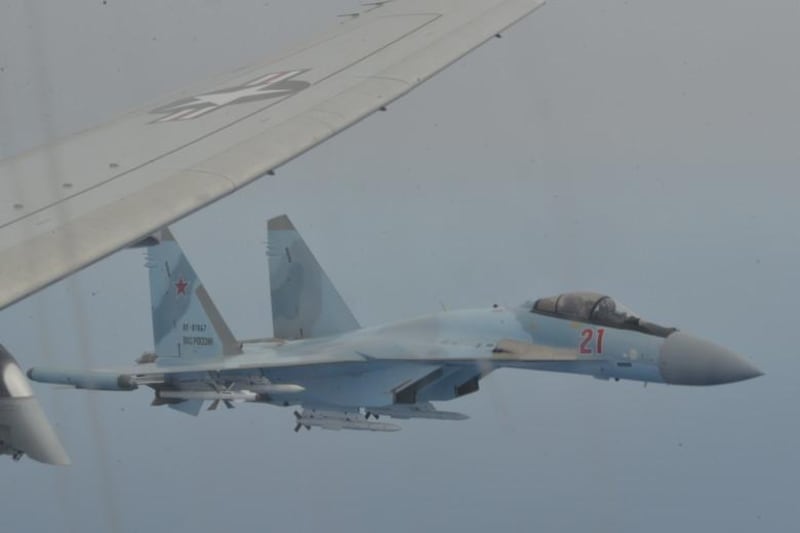Tension between the US and Russia has increased in the eastern Mediterranean after Russian jets intercepted a US Navy plane in the region.
The US Navy’s 6th Fleet said the two Russian SU-35 jets intercepted a P-8A aircraft for more than an hour in the third such recent incident over the Mediterranean Sea.
“The intercept was determined to be unsafe and unprofessional due to the Russian pilots taking close station on each wing of the P-8A simultaneously, restricting the P-8A’s ability to safely manoeuvre,” the US military said.
“The unnecessary actions of the Russian SU-35 pilots were inconsistent with good airmanship and international flight rules, and jeopardised the safety of flight of both aircraft."
The tense manoeuvres over the Mediterranean come as a decades-old dispute between Greece and Turkey on the island of Cyprus, now involving competition over natural gas reserves, has drawn in world and regional powers.
It has also intersected with the civil wars in Libya and Syria.

“In the eastern Mediterranean, a scramble is under way between countries in the region for access to recently discovered gas fields,” a European Council on Foreign Relations report said.
"Conflicting legal claims to the fields are merging with old and new conflicts, and have led to the creation of a new geopolitical front in the eastern Mediterranean that should cause Europeans substantial concern."
In the past, the potential for conflict has been shown in interactions between Turkey and nations including France, Greece and Cyprus.
This month the UAE met officials from Cyprus, Egypt, France and Greece to discuss recent attempts by Turkey to drill for gas in Cyprus’s territorial water.
Turkey has claimed waters around Cyprus and extending towards Libya after Ankara struck a deal with the Government of National Accord in Tripoli, which granted access in exchange for military aid last year.
The five nations condemned Turkey’s “illegal activities” in Cyprus’s exclusive economic zone.
The UAE Minister of State for Foreign Affairs, Dr Anwar Gargash, emphasised the importance of upholding international law in the eastern Mediterranean.
At a Chatham House event on Wednesday, Dr Thanos Dokos, Greece's deputy national security adviser, said Europe's lack of meaningful engagement in Libya and Syria would continue to be to its detriment.
"We have been absent from Syria despite the fact that Europe has been paying a heavy price in terms of refugee and migrant flows," Dr Dokos said.
"We have only a limited role in Libya so unless we start trying seriously to shape our neighbourhood and stabilise those countries, we will continue to pay a heavy price."
In February, France sent the Charles de Gaulle aircraft carrier to block Turkish naval vessels near contested gasfields close to Cyprus.

“The fact that Nato allies are staring each other down on the European Union’s doorstep should cause all Europeans to pay greater attention to the region,” the European report said.
After a flurry of diplomatic activity from US Secretary of State Mike Pompeo in relation to Libya in recent weeks, the US has accused Russia of backing factions led by Field Marshal Khalifa Haftar, commander of the Libyan National Army.
Moscow has routinely dismissed US accusations of Russian involvement in Libya as “fake”.
On Tuesday, Pentagon spokesman Jonathan Hoffman seemed to issue a warning to Ankara and Moscow over an escalation of violence in Libya.
He called on all parties to deliver peace to the country.
“We call on all parties operating in Libya, the Russians and the Turks and others, to cease their behaviour there. We want a secure and stable Libya,” Mr Hoffman said.
“We believe our mission there supports diplomatic and counter-terrorism efforts, enhancing the partnership.
“We would ask that others consider similar activities to give the Libyan people the safety and security they deserve.”







